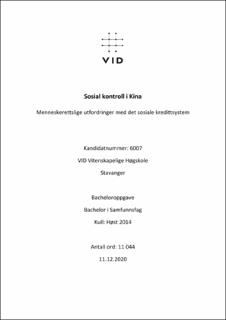| dc.contributor.author | Veerbeek, Veronica Skollevoll | |
| dc.coverage.spatial | Kina | en_US |
| dc.date.accessioned | 2021-03-24T14:45:12Z | |
| dc.date.available | 2021-03-24T14:45:12Z | |
| dc.date.issued | 2020-12 | |
| dc.identifier.uri | https://hdl.handle.net/11250/2735343 | |
| dc.description | Bacheloroppgave i samfunnsfag, VID vitenskapelige høgskole, Stavanger, desember 2020 | en_US |
| dc.description.abstract | Since the Communists came to power in China in 1949, the population has been subject to
very extensive forms of social control, and the Chinese authorities have repeatedly been
accused of systematic human rights violations. In connection with advanced technological
innovations, and a number of ambitious projects, China has since the beginning of the
People's Republic been transformed from a poor agricultural society to a modern industrial
society, where hundreds of millions of people have been «lifted» out of poverty.
The current president, Xi Jinping, has proclaimed great plans for China's future, and is
investing heavily in technological development and artificial intelligence in the construction
4
of the China of the future. However, the authorities are dependent on ensuring legitimacy and
control in order for the visions to be realized. In 2014, work began on developing a so-called
social credit system that will function more or less as an overriding control mechanism, with
the aim of ensuring lasting social and economic stability and growth, by increasing trust in the
Chinese society. Using a literature study and a qualitative approach, I have investigated how
the exercise of social control in China and the implementation of the social credit system,
affect human rights conditions in the country. I am seeking answers to the following question:
What consequences will China's social credit system have on human rights in the country?
The conclusion shows that the system is in danger of violating fundamental rights such as
freedom of expression and the right to privacy, and could also have direct consequences with
regard to freedom of association, freedom of movement and political participation. There is
further cause for concern that the system can be used for purposes that have an oppressive and
discriminatory effect on vulnerable groups in the country, as well as contribute to weakening
an already weak rule of law. | en_US |
| dc.description.abstract | Siden kommunistene kom til makten i Kina i 1949 har befolkningen vært underlagt svært
omfattende former for sosial kontroll, og kinesiske myndighetene har gang på gang blitt
beskyldt for systematiske brudd på menneskerettighetene. I forbindelse med avanserte
teknologiske nyvinninger, og en rekke ambisiøse prosjekter, har Kina siden folkerepublikkens
begynnelse blitt transformert fra et fattig jordbrukssamfunn til et moderne industrisamfunn,
hvor flere hundre millioner mennesker har blitt «løftet» ut av fattigdom.
Nåværende president, Xi Jinping, har proklamert store planer for Kinas fremtid, og satser stort
på teknologisk utvikling og kunstig intelligens i konstruksjonen av fremtidens Kina.
Myndighetene er imidlertid avhengig av å sikre legitimitet og kontroll for at visjonene skal
kunne realiseres. I 2014 startet arbeidet med å utvikle et såkalt sosialt kredittsystem som vil
fungere mer eller mindre som en overordnet kontrollmekanisme, med det formål å sikre
vedvarende sosial og økonomisk stabilitet og vekst, ved å øke tillitten i det kinesiske
samfunnet. Ved hjelp av litteraturstudie og en kvalitativ tilnærming har jeg undersøkt hvordan
utøvelse av sosial kontroll i Kina og implementeringen av det sosiale kredittsystemet,
påvirker menneskerettslige forhold i landet. Jeg søker svar på følgende problemstilling:
Hvilke konsekvenser vil Kinas sosiale kredittsystem kunne få for menneskerettslige forhold i
landet?
Konklusjonen viser at systemet står i fare for å krenke grunnleggende rettigheter som
ytringsfrihet og privatlivets rett, og vil også kunne få direkte konsekvenser med hensyn til
organisasjonsfrihet, bevegelsesfrihet og politisk deltakelse. Det er videre grunn til bekymring
for at systemet kan benyttes til formål som virker undertrykkende og diskriminerende overfor
utsatte grupper i landet, samt bidra til å svekke en allerede svak rettsstat. | en_US |
| dc.language.iso | nob | en_US |
| dc.subject | sosial kontroll | en_US |
| dc.subject | Kina | en_US |
| dc.subject | menneskerettigheter | en_US |
| dc.title | Sosial kontroll i Kina : menneskerettslige utfordringer med det sosiale kredittsystem | en_US |
| dc.type | Bachelor thesis | en_US |
| dc.description.version | submittedVersion | en_US |
| dc.rights.holder | Forfatteren har opphavsrettighetene til rapporten. Nedlasting for privat bruk er tillatt. | en_US |
| dc.subject.nsi | VDP::Samfunnsvitenskap: 200 | en_US |
| dc.source.pagenumber | 47 | en_US |
